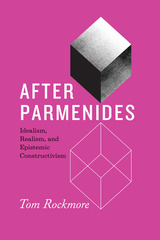
In After Parmenides, Tom Rockmore takes us all the way back to the beginning of Western philosophy, when Parmenides asserted that thought and being are the same. This idea created a division between what the mind constructs as knowable entities and the idea that there is also a mind-independent real, which we can know or fail to know. Rockmore argues that we need to give up on the idea of knowing the real as it is, and instead focus on the objects of cognition that our mind constructs. Though we cannot know mind-independent objects as they “really” are, we can and do know objects as they appear to us.
After Parmenides charts the continual engagement with these ideas of the real and the knowable throughout philosophical history from Plato and Aristotle to Descartes, Kant, Fichte, Hegel, Schopenhauer, Marx, and others. This ambitious book shows how new connections can be made in the history of philosophy when it is reread through a new lens.

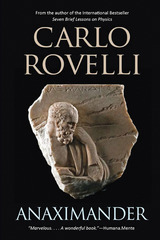
THIS BOOK IS NO LONGER AVAILABLE.
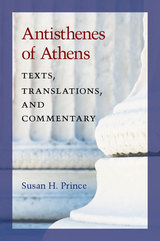
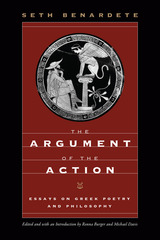
This volume brings together Seth Benardete’s studies of Hesiod, Homer, and Greek tragedy, eleven Platonic dialogues, and Aristotle’s Metaphysics.
The Argument of the Action spans four decades of Seth Benardete’s work, documenting its impressive range. Benardete’s philosophic reading of the poets and his poetic reading of the philosophers share a common ground, guided by the key he found in the Platonic dialogue: probing the meaning of speeches embedded in deeds, he uncovers the unifying intention of the work by tracing the way it unfolds through a movement of its own. Benardete’s original interpretations of the classics are the fruit of this discovery of the “argument of the action.”
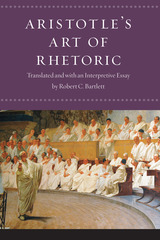
Here Robert C. Bartlett offers a literal, yet easily readable, new translation of Aristotle’s “Art of Rhetoric,” one that takes into account important alternatives in the manuscript and is fully annotated to explain historical, literary, and other allusions. Bartlett’s translation is also accompanied by an outline of the argument of each book; copious indexes, including subjects, proper names, and literary citations; a glossary of key terms; and a substantial interpretive essay.
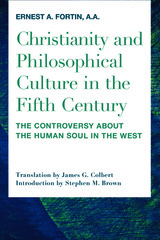
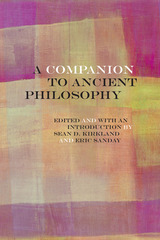
Rather than offering synoptic and summary treatments of preestablished positions and themes, these essays engage with the ancient texts directly, focusing attention on concepts that emerge as urgent in the readings themselves and then clarifying those concepts interpretively. Indeed, this is a companion volume that takes a very serious and considered approach to its designated task—accompanying readers as they move through the most crucial passages of the infinitely rich and compelling texts of the ancients. Each essay provides a tutorial in close reading and careful interpretation.
Because it offers foundational treatments of the most important works of ancient philosophy and because it, precisely by doing so, arrives at numerous original interpretive insights and suggests new directions for research in ancient philosophy, this volume should be of great value both to students just starting off reading the ancients and to established scholars still fascinated by philosophy's deepest abiding questions.
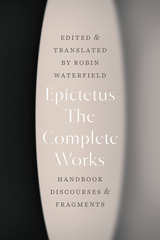
“Some things are up to us and some are not.”
Epictetus was born into slavery around the year 50 CE, and, upon being granted his freedom, he set himself up as a philosophy teacher. After being expelled from Rome, he spent the rest of his life living and teaching in Greece. He is now considered the most important exponent of Stoicism, and his surviving work comprises a series of impassioned discourses, delivered live and recorded by his student Arrian, and the Handbook, Arrian’s own take on the heart of Epictetus’s teaching.
In Discourses, Epictetus argues that happiness depends on knowing what is in our power to affect and what is not. Our internal states and our responses to events are up to us, but the events themselves are assigned to us by the benevolent deity, and we should treat them—along with our bodies, possessions, and families—as matters of indifference, simply making the best use of them we can. Together, the Discourses and Handbook constitute a practical guide to moral self-improvement, as Epictetus explains the work and exercises aspirants need to do to enrich and deepen their lives. Edited and translated by renowned scholar Robin Waterfield, this book collects the complete works of Epictetus, bringing to modern readers his insights on how to cope with death, exile, the people around us, the whims of the emperor, fear, illness, and much more.
CUSTOMER NOTE: THE HARDCOVER IS FOR LIBRARIES AND HAS NO JACKET.
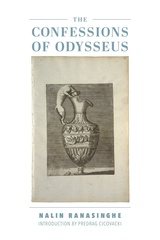
Predrag Cicovacki in his indispensable preface to the book, elucidates: “In Ranasinghe’s view, Odysseus is both the first recognizable human being and a model of curious and concupiscent human rationality that constantly strives toward the virtues of self-knowledge and moderation. Homer leads us to believe that the cosmos leans toward virtue, although its fundamental truths may be inherently unspeakable. This is the line of thought that Ranasinghe believes was further developed by Socrates, Plato, and Jesus, while being obscured by Aristotle, Augustine, and their followers. Homer’s later epic and his central insights are, according to Ranasinghe, the most fertile soil on which a humane civilization can grow and flourish.”
Yet Ranasinghe ultimately says it best. “Homer must be read as the wisest Greeks did, not for fantastic tales of the Olympians but because his myths reveal eternal constants of the human state: the soul’s ruling passions and the possibility of knowing and educating these false gods. Wrestled with thus the Iliad becomes a cautionary tale, not one urging literal reading or mindless mimesis. It may always be that for the few who grasp Homer, many more will obey his gods or imitate his antiheroes; but the Odyssey hints that while its poet sees this potential for misuse, he is willing to take a noble risk and hope that eros can listen to and educate thumos. This faith is implicit in his tale of Achilles and the Trojan War. It is vital today that we see how the West’s end resembles its angry origins, as depicted in the Iliad. This is why Homer is said to be as fresh as the morning newspaper. His wisdom may outlive our literacy.”

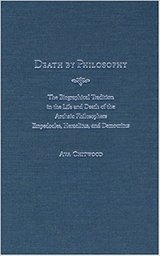
How does one die by philosophy? In Diogenes Laertius, philosophers jump into volcanoes, bury themselves in dung, get eaten by dogs, hang themselves, drown, and vanish into thin air -- sometimes all in a single lifetime. But what happens when we look beyond the fantastic and absurd to examine the particular ways that the philosophers' lives and deaths are recounted?
Ava Chitwood's reexamination of Diogenes Laertius's philosophical biographies opens a new window on the intellectual culture and context in which the work of philosophers like Empedocles, Heraclitus, and Democritus was read, received, and transmitted. Chitwood's analysis also suggests a methodology for understanding the interplay between biography and philosophy and for evaluating biographical sources.
While Chitwood's approach combines the disciplines of classical philology and philosophy, Death by Philosophy is not intended solely for the specialist. This investigation offers the modern reader a fascinating, fresh, and entertaining view of the ancient literary and philosophical world.
Ava Chitwood is Assistant Professor of Classics, at the University of South Florida.
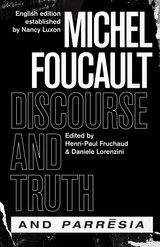
These lectures—carefully edited and including notes and introductory material to fully illuminate Foucault’s insights—are a major addition to Foucault’s English language corpus.
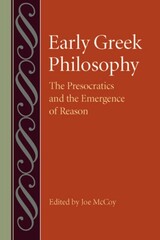

A major new edition of the so-called Presocratics.
The fragments and testimonia of the early Greek philosophers (often labeled the ‘Presocratics’) have always been not only a fundamental source for understanding archaic Greek culture and ancient philosophy but also a perennially fresh resource that has stimulated Western thought until the present day. This new systematic conception and presentation of the evidence differs in three ways from Hermann Diels’s groundbreaking work, as well as from later editions: it renders explicit the material’s thematic organization; it includes a selection from such related bodies of evidence as archaic poetry, classical drama, and the Hippocratic corpus; and it presents an overview of the reception of these thinkers until the end of antiquity.
Volume I contains introductory and reference materials essential for using all other parts of the edition.
Volume II presents preliminary chapters on ancient doxography, the cosmological and moral background, and includes the early Ionian thinkers Pherecydes, Thales, Anaximander, and Anaximenes.
Volume III includes the early Ionian thinkers Xenophanes and Heraclitus.
Volume IV presents Pythagoras and the Pythagorean School, including Hippasus, Philolaus, Eurytus, Archytas, Hicetas, and Ecphantus, along with chapters on doctrines not attributed by name and reception.
Volume V includes the western Greek thinkers Parmenides, Zeno, Melissus, Empedocles, Alcmaeon, and Hippo.
Volume Vi includes the later Ionian and Athenian thinkers Anaxagoras, Archelaus, and Diogenes of Apollonia, along with chapters on early Greek medicine and the Derveni Papyrus.
Volume VII includes the atomists Leucippus and Democritus.
Volume VIII includes the so-called sophists Protagoras, Gorgias, Prodicus, Thrasymachus, and Hippias, along with testimonia relating to the life, views, and argumentative style of Socrates.
Volume IX includes the so-called sophists Antiphon, Lycophron, and Xeniades, along with the Anonymous of Iamblichus, the Dissoi Logoi, a chapter on characterizations of the ‘sophists’ as a group, and an appendix on philosophy and philosophers in Greek drama.

A major new edition of the so-called Presocratics.
The fragments and testimonia of the early Greek philosophers (often labeled the ‘Presocratics’) have always been not only a fundamental source for understanding archaic Greek culture and ancient philosophy but also a perennially fresh resource that has stimulated Western thought until the present day. This new systematic conception and presentation of the evidence differs in three ways from Hermann Diels’s groundbreaking work, as well as from later editions: it renders explicit the material’s thematic organization; it includes a selection from such related bodies of evidence as archaic poetry, classical drama, and the Hippocratic corpus; and it presents an overview of the reception of these thinkers until the end of antiquity.
Volume I contains introductory and reference materials essential for using all other parts of the edition.
Volume II presents preliminary chapters on ancient doxography, the cosmological and moral background, and includes the early Ionian thinkers Pherecydes, Thales, Anaximander, and Anaximenes.
Volume III includes the early Ionian thinkers Xenophanes and Heraclitus.
Volume IV presents Pythagoras and the Pythagorean School, including Hippasus, Philolaus, Eurytus, Archytas, Hicetas, and Ecphantus, along with chapters on doctrines not attributed by name and reception.
Volume V includes the western Greek thinkers Parmenides, Zeno, Melissus, Empedocles, Alcmaeon, and Hippo.
Volume Vi includes the later Ionian and Athenian thinkers Anaxagoras, Archelaus, and Diogenes of Apollonia, along with chapters on early Greek medicine and the Derveni Papyrus.
Volume VII includes the atomists Leucippus and Democritus.
Volume VIII includes the so-called sophists Protagoras, Gorgias, Prodicus, Thrasymachus, and Hippias, along with testimonia relating to the life, views, and argumentative style of Socrates.
Volume IX includes the so-called sophists Antiphon, Lycophron, and Xeniades, along with the Anonymous of Iamblichus, the Dissoi Logoi, a chapter on characterizations of the ‘sophists’ as a group, and an appendix on philosophy and philosophers in Greek drama.

A major new edition of the so-called Presocratics.
The fragments and testimonia of the early Greek philosophers (often labeled the ‘Presocratics’) have always been not only a fundamental source for understanding archaic Greek culture and ancient philosophy but also a perennially fresh resource that has stimulated Western thought until the present day. This new systematic conception and presentation of the evidence differs in three ways from Hermann Diels’s groundbreaking work, as well as from later editions: it renders explicit the material’s thematic organization; it includes a selection from such related bodies of evidence as archaic poetry, classical drama, and the Hippocratic corpus; and it presents an overview of the reception of these thinkers until the end of antiquity.
Volume I contains introductory and reference materials essential for using all other parts of the edition.
Volume II presents preliminary chapters on ancient doxography, the cosmological and moral background, and includes the early Ionian thinkers Pherecydes, Thales, Anaximander, and Anaximenes.
Volume III includes the early Ionian thinkers Xenophanes and Heraclitus.
Volume IV presents Pythagoras and the Pythagorean School, including Hippasus, Philolaus, Eurytus, Archytas, Hicetas, and Ecphantus, along with chapters on doctrines not attributed by name and reception.
Volume V includes the western Greek thinkers Parmenides, Zeno, Melissus, Empedocles, Alcmaeon, and Hippo.
Volume Vi includes the later Ionian and Athenian thinkers Anaxagoras, Archelaus, and Diogenes of Apollonia, along with chapters on early Greek medicine and the Derveni Papyrus.
Volume VII includes the atomists Leucippus and Democritus.
Volume VIII includes the so-called sophists Protagoras, Gorgias, Prodicus, Thrasymachus, and Hippias, along with testimonia relating to the life, views, and argumentative style of Socrates.
Volume IX includes the so-called sophists Antiphon, Lycophron, and Xeniades, along with the Anonymous of Iamblichus, the Dissoi Logoi, a chapter on characterizations of the ‘sophists’ as a group, and an appendix on philosophy and philosophers in Greek drama.

A major new edition of the so-called Presocratics.
The fragments and testimonia of the early Greek philosophers (often labeled the ‘Presocratics’) have always been not only a fundamental source for understanding archaic Greek culture and ancient philosophy but also a perennially fresh resource that has stimulated Western thought until the present day. This new systematic conception and presentation of the evidence differs in three ways from Hermann Diels’s groundbreaking work, as well as from later editions: it renders explicit the material’s thematic organization; it includes a selection from such related bodies of evidence as archaic poetry, classical drama, and the Hippocratic corpus; and it presents an overview of the reception of these thinkers until the end of antiquity.
Volume I contains introductory and reference materials essential for using all other parts of the edition.
Volume II presents preliminary chapters on ancient doxography, the cosmological and moral background, and includes the early Ionian thinkers Pherecydes, Thales, Anaximander, and Anaximenes.
Volume III includes the early Ionian thinkers Xenophanes and Heraclitus.
Volume IV presents Pythagoras and the Pythagorean School, including Hippasus, Philolaus, Eurytus, Archytas, Hicetas, and Ecphantus, along with chapters on doctrines not attributed by name and reception.
Volume V includes the western Greek thinkers Parmenides, Zeno, Melissus, Empedocles, Alcmaeon, and Hippo.
Volume Vi includes the later Ionian and Athenian thinkers Anaxagoras, Archelaus, and Diogenes of Apollonia, along with chapters on early Greek medicine and the Derveni Papyrus.
Volume VII includes the atomists Leucippus and Democritus.
Volume VIII includes the so-called sophists Protagoras, Gorgias, Prodicus, Thrasymachus, and Hippias, along with testimonia relating to the life, views, and argumentative style of Socrates.
Volume IX includes the so-called sophists Antiphon, Lycophron, and Xeniades, along with the Anonymous of Iamblichus, the Dissoi Logoi, a chapter on characterizations of the ‘sophists’ as a group, and an appendix on philosophy and philosophers in Greek drama.

A major new edition of the so-called Presocratics.
The fragments and testimonia of the early Greek philosophers (often labeled the ‘Presocratics’) have always been not only a fundamental source for understanding archaic Greek culture and ancient philosophy but also a perennially fresh resource that has stimulated Western thought until the present day. This new systematic conception and presentation of the evidence differs in three ways from Hermann Diels’s groundbreaking work, as well as from later editions: it renders explicit the material’s thematic organization; it includes a selection from such related bodies of evidence as archaic poetry, classical drama, and the Hippocratic corpus; and it presents an overview of the reception of these thinkers until the end of antiquity.
Volume I contains introductory and reference materials essential for using all other parts of the edition.
Volume II presents preliminary chapters on ancient doxography, the cosmological and moral background, and includes the early Ionian thinkers Pherecydes, Thales, Anaximander, and Anaximenes.
Volume III includes the early Ionian thinkers Xenophanes and Heraclitus.
Volume IV presents Pythagoras and the Pythagorean School, including Hippasus, Philolaus, Eurytus, Archytas, Hicetas, and Ecphantus, along with chapters on doctrines not attributed by name and reception.
Volume V includes the western Greek thinkers Parmenides, Zeno, Melissus, Empedocles, Alcmaeon, and Hippo.
Volume Vi includes the later Ionian and Athenian thinkers Anaxagoras, Archelaus, and Diogenes of Apollonia, along with chapters on early Greek medicine and the Derveni Papyrus.
Volume VII includes the atomists Leucippus and Democritus.
Volume VIII includes the so-called sophists Protagoras, Gorgias, Prodicus, Thrasymachus, and Hippias, along with testimonia relating to the life, views, and argumentative style of Socrates.
Volume IX includes the so-called sophists Antiphon, Lycophron, and Xeniades, along with the Anonymous of Iamblichus, the Dissoi Logoi, a chapter on characterizations of the ‘sophists’ as a group, and an appendix on philosophy and philosophers in Greek drama.

A major new edition of the so-called Presocratics.
The fragments and testimonia of the early Greek philosophers (often labeled the ‘Presocratics’) have always been not only a fundamental source for understanding archaic Greek culture and ancient philosophy but also a perennially fresh resource that has stimulated Western thought until the present day. This new systematic conception and presentation of the evidence differs in three ways from Hermann Diels’s groundbreaking work, as well as from later editions: it renders explicit the material’s thematic organization; it includes a selection from such related bodies of evidence as archaic poetry, classical drama, and the Hippocratic corpus; and it presents an overview of the reception of these thinkers until the end of antiquity.
Volume I contains introductory and reference materials essential for using all other parts of the edition.
Volume II presents preliminary chapters on ancient doxography, the cosmological and moral background, and includes the early Ionian thinkers Pherecydes, Thales, Anaximander, and Anaximenes.
Volume III includes the early Ionian thinkers Xenophanes and Heraclitus.
Volume IV presents Pythagoras and the Pythagorean School, including Hippasus, Philolaus, Eurytus, Archytas, Hicetas, and Ecphantus, along with chapters on doctrines not attributed by name and reception.
Volume V includes the western Greek thinkers Parmenides, Zeno, Melissus, Empedocles, Alcmaeon, and Hippo.
Volume Vi includes the later Ionian and Athenian thinkers Anaxagoras, Archelaus, and Diogenes of Apollonia, along with chapters on early Greek medicine and the Derveni Papyrus.
Volume VII includes the atomists Leucippus and Democritus.
Volume VIII includes the so-called sophists Protagoras, Gorgias, Prodicus, Thrasymachus, and Hippias, along with testimonia relating to the life, views, and argumentative style of Socrates.
Volume IX includes the so-called sophists Antiphon, Lycophron, and Xeniades, along with the Anonymous of Iamblichus, the Dissoi Logoi, a chapter on characterizations of the ‘sophists’ as a group, and an appendix on philosophy and philosophers in Greek drama.

A major new edition of the so-called Presocratics.
The fragments and testimonia of the early Greek philosophers (often labeled the ‘Presocratics’) have always been not only a fundamental source for understanding archaic Greek culture and ancient philosophy but also a perennially fresh resource that has stimulated Western thought until the present day. This new systematic conception and presentation of the evidence differs in three ways from Hermann Diels’s groundbreaking work, as well as from later editions: it renders explicit the material’s thematic organization; it includes a selection from such related bodies of evidence as archaic poetry, classical drama, and the Hippocratic corpus; and it presents an overview of the reception of these thinkers until the end of antiquity.
Volume I contains introductory and reference materials essential for using all other parts of the edition.
Volume II presents preliminary chapters on ancient doxography, the cosmological and moral background, and includes the early Ionian thinkers Pherecydes, Thales, Anaximander, and Anaximenes.
Volume III includes the early Ionian thinkers Xenophanes and Heraclitus.
Volume IV presents Pythagoras and the Pythagorean School, including Hippasus, Philolaus, Eurytus, Archytas, Hicetas, and Ecphantus, along with chapters on doctrines not attributed by name and reception.
Volume V includes the western Greek thinkers Parmenides, Zeno, Melissus, Empedocles, Alcmaeon, and Hippo.
Volume Vi includes the later Ionian and Athenian thinkers Anaxagoras, Archelaus, and Diogenes of Apollonia, along with chapters on early Greek medicine and the Derveni Papyrus.
Volume VII includes the atomists Leucippus and Democritus.
Volume VIII includes the so-called sophists Protagoras, Gorgias, Prodicus, Thrasymachus, and Hippias, along with testimonia relating to the life, views, and argumentative style of Socrates.
Volume IX includes the so-called sophists Antiphon, Lycophron, and Xeniades, along with the Anonymous of Iamblichus, the Dissoi Logoi, a chapter on characterizations of the ‘sophists’ as a group, and an appendix on philosophy and philosophers in Greek drama.

A major new edition of the so-called Presocratics.
The fragments and testimonia of the early Greek philosophers (often labeled the ‘Presocratics’) have always been not only a fundamental source for understanding archaic Greek culture and ancient philosophy but also a perennially fresh resource that has stimulated Western thought until the present day. This new systematic conception and presentation of the evidence differs in three ways from Hermann Diels’s groundbreaking work, as well as from later editions: it renders explicit the material’s thematic organization; it includes a selection from such related bodies of evidence as archaic poetry, classical drama, and the Hippocratic corpus; and it presents an overview of the reception of these thinkers until the end of antiquity.
Volume I contains introductory and reference materials essential for using all other parts of the edition.
Volume II presents preliminary chapters on ancient doxography, the cosmological and moral background, and includes the early Ionian thinkers Pherecydes, Thales, Anaximander, and Anaximenes.
Volume III includes the early Ionian thinkers Xenophanes and Heraclitus.
Volume IV presents Pythagoras and the Pythagorean School, including Hippasus, Philolaus, Eurytus, Archytas, Hicetas, and Ecphantus, along with chapters on doctrines not attributed by name and reception.
Volume V includes the western Greek thinkers Parmenides, Zeno, Melissus, Empedocles, Alcmaeon, and Hippo.
Volume Vi includes the later Ionian and Athenian thinkers Anaxagoras, Archelaus, and Diogenes of Apollonia, along with chapters on early Greek medicine and the Derveni Papyrus.
Volume VII includes the atomists Leucippus and Democritus.
Volume VIII includes the so-called sophists Protagoras, Gorgias, Prodicus, Thrasymachus, and Hippias, along with testimonia relating to the life, views, and argumentative style of Socrates.
Volume IX includes the so-called sophists Antiphon, Lycophron, and Xeniades, along with the Anonymous of Iamblichus, the Dissoi Logoi, a chapter on characterizations of the ‘sophists’ as a group, and an appendix on philosophy and philosophers in Greek drama.

A major new edition of the so-called Presocratics.
The fragments and testimonia of the early Greek philosophers (often labeled the ‘Presocratics’) have always been not only a fundamental source for understanding archaic Greek culture and ancient philosophy but also a perennially fresh resource that has stimulated Western thought until the present day. This new systematic conception and presentation of the evidence differs in three ways from Hermann Diels’s groundbreaking work, as well as from later editions: it renders explicit the material’s thematic organization; it includes a selection from such related bodies of evidence as archaic poetry, classical drama, and the Hippocratic corpus; and it presents an overview of the reception of these thinkers until the end of antiquity.
Volume I contains introductory and reference materials essential for using all other parts of the edition.
Volume II presents preliminary chapters on ancient doxography, the cosmological and moral background, and includes the early Ionian thinkers Pherecydes, Thales, Anaximander, and Anaximenes.
Volume III includes the early Ionian thinkers Xenophanes and Heraclitus.
Volume IV presents Pythagoras and the Pythagorean School, including Hippasus, Philolaus, Eurytus, Archytas, Hicetas, and Ecphantus, along with chapters on doctrines not attributed by name and reception.
Volume V includes the western Greek thinkers Parmenides, Zeno, Melissus, Empedocles, Alcmaeon, and Hippo.
Volume Vi includes the later Ionian and Athenian thinkers Anaxagoras, Archelaus, and Diogenes of Apollonia, along with chapters on early Greek medicine and the Derveni Papyrus.
Volume VII includes the atomists Leucippus and Democritus.
Volume VIII includes the so-called sophists Protagoras, Gorgias, Prodicus, Thrasymachus, and Hippias, along with testimonia relating to the life, views, and argumentative style of Socrates.
Volume IX includes the so-called sophists Antiphon, Lycophron, and Xeniades, along with the Anonymous of Iamblichus, the Dissoi Logoi, a chapter on characterizations of the ‘sophists’ as a group, and an appendix on philosophy and philosophers in Greek drama.
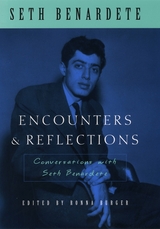
The first part of the book discloses vignettes about fellow students, colleagues, and acquaintances of Benardete's who later became major figures in the academic and intellectual life of twentieth-century America. We glimpse the student days of Allan Bloom, Stanley Rosen, George Steiner, and we discover the life of the mind as lived by well-known scholars such as David Grene, Jacob Klein, and Benardete's mentor Leo Strauss. We also encounter a number of other learned, devoted, and sometimes eccentric luminaries, including T.S. Eliot, James Baldwin, Werner Jaeger, John Davidson Beazley, and Willard Quine. In the book's second part, Benardete reflects on his own intellectual growth and on his ever-evolving understanding of the texts and ideas he spent a lifetime studying. Revisiting some of his recurrent themes—among them eros and the beautiful, the city and the law, and the gods and the human soul—Benardete shares his views on thinkers such as Plato, Homer, and Heidegger, as well as the relations between philosophy and science and between Christianity and ancient Roman thought.
Engaging and informative, Encounters and Reflections brings Benardete's thought to life to enlighten and inspire a new generation of thinkers.
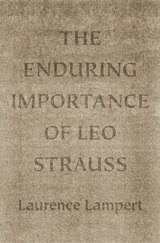

Essays in Ancient Philosophy was first published in 1987. Minnesota Archive Editions uses digital technology to make long-unavailable books once again accessible, and are published unaltered from the original University of Minnesota Press editions.
To understand ancient philosophy "in its concrete, complex detail," Michael Frede says, "one has also to look at all the other histories to which it is tied by an intricate web of casual connections which run both ways." Frede's distinctive approach to the history of ancient philosophy is closely tied to his specific interests within the field - the Hellenistic philosophers and those of late antiquity, who are the primary subjects of this book. Long ignored or even maligned, the Stoics and Skeptics, medical philosophers, and grammarians are extremely interesting once their actual views are reconstructed and it is possible to recognize their ties to earlier and later philosophical thought. Refusing to study them as paradigms of achievement, or to seek purely philosophical explanations for their views, Frede draws instead upon those "other histories"—of religion, social structure, law and politics—to illuminate their work and to show how it was interpreted and transformed by succeeding generations.

The fundamental tetralogy on Socrates’ final days.
Plato of Athens, who laid the foundations of the Western philosophical tradition and in range and depth ranks among its greatest practitioners, was born to a prosperous and politically active family circa 427 BC. In early life an admirer of Socrates, Plato later founded the first institution of higher learning in the West, the Academy, among whose many notable alumni was Aristotle. Traditionally ascribed to Plato are thirty-five dialogues developing Socrates’ dialectic method and composed with great stylistic virtuosity, together with the Apology and thirteen letters.
The four works in this volume recount the circumstances of Socrates’ trial and execution in 399 BC. In Euthyphro, set in the weeks before the trial, Socrates and Euthyphro attempt to define holiness. In Apology, Socrates answers his accusers at trial and unapologetically defends his philosophical career. In Crito, a discussion of justice and injustice explains Socrates’ refusal of Crito’s offer to finance his escape from prison. And in Phaedo, Socrates discusses the concept of an afterlife and offers arguments for the immortality of the soul. This edition, which replaces the original Loeb edition by Harold North Fowler, offers text, translation, and annotation that are fully current with modern scholarship.
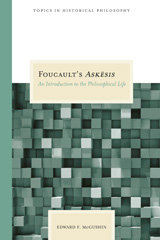
Through a detailed study of Foucault's last courses, McGushin demonstrates that this new way of practicing philosophical askēsis evokes Foucault's ethical resistance to modern relations of power and knowledge. In order to understand Foucault's later project, then, it is necessary to see it within the context of his earlier work. If his earlier projects represented an attempt to bring to light the relations of power and knowledge that narrowed and limited freedom, then this last project represents his effort to take back that freedom by redefining it in terms of care of the self. Foucault always stressed that modern power functions by producing individual subjects. This book shows how his excavation of ancient philosophical practices gave him the tools to counter this function-with a practice of self-formation, an askēsis.
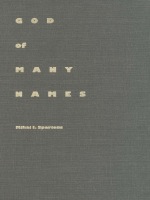
Building upon the scholarship of an earlier volume, Dionysus Reborn, Spariosu her continues to draw on Dionysus—the “God of many names,” of both poetic play and sacred power—as a mythical embodiment of the two sides of the classical Greek mentality. Combining philosophical reflection with close textual analysis, the author examines the divided nature of the Hellenic mentality in such primary canonic texts as the Iliad, the Odyssey, the Theogony, Works and Days, the most well-known of the Presocratic fragments, Euripides’ Bacchae, Aristophanes’ The Frogs, Plato’s Republic and Laws, and Aristotle’s Poetics and Politics.
Spariosu’s model illuminates the many of the most enduring questions in contemporary humanistic study and addresses modern questions about the nature of the interrelation of poetry, ethics, and politics.
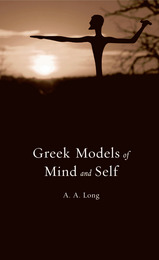
This lively book offers a wide-ranging study of Greek notions of mind and human selfhood from Homer through Plotinus. A. A. Long anchors his discussion in questions of recurrent and universal interest. What happens to us when we die? How is the mind or soul related to the body? Are we responsible for our own happiness? Can we achieve autonomy? Long asks when and how these questions emerged in ancient Greece, and shows that Greek thinkers’ modeling of the mind gave us metaphors that we still live by, such as the rule of reason or enslavement to passion. He also interrogates the less familiar Greek notion of the intellect’s divinity, and asks what that might mean for us.
Because Plato’s dialogues articulate these themes more sharply and influentially than works by any other Greek thinker, Plato receives the most sustained treatment in this account. But at the same time, Long asks whether Plato’s explanation of the mind and human behavior is more convincing for modern readers than that contained in the older Homeric poems. Turning to later ancient philosophy, especially Stoicism, Long concludes with an exploration of Epictetus’s injunction to live life by making correct use of one’s mental impressions.
An authoritative treatment of Greek modes of self-understanding, Greek Models of Mind and Self demonstrates how ancient thinkers grappled with what is closest to us and yet still most mysterious—our own essence as singular human selves—and how the study of Greek thought can enlarge and enrich our experience.
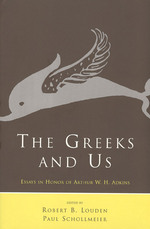
The timely subjects addressed by the contributors include the relation between literature and moral understanding, moral and nonmoral values, and the contemporary meaning of ancient Greek ethics. The volume also includes an essay from the late Adkins himself illustrating his methodology in an analysis of the "Speech of Lysias" in Plato's Phaedrus.
The Greeks and Us will interest all those concerned with how ancient moral values do or do not differ from our own.
Contributors include Arthur W. H. Adkins, Stephanie Nelson, Martha C. Nussbaum, Paul Schollmeier, James Boyd White, Bernard Williams, and Lee Yearley.
Commentaries by Wendy Doniger, Charles M. Gray, David Grene, Robert B. Louden, Richard Posner, and Candace Vogler.
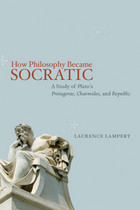
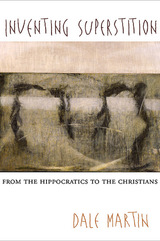
The Roman author Pliny the Younger characterizes Christianity as “contagious superstition”; two centuries later the Christian writer Eusebius vigorously denounces Greek and Roman religions as vain and impotent “superstitions.” The term of abuse is the same, yet the two writers suggest entirely different things by “superstition.”
Dale Martin provides the first detailed genealogy of the idea of superstition, its history over eight centuries, from classical Greece to the Christianized Roman Empire of the fourth century C.E. With illuminating reference to the writings of philosophers, historians, and medical teachers he demonstrates that the concept of superstition was invented by Greek intellectuals to condemn popular religious practices and beliefs, especially the belief that gods or other superhuman beings would harm people or cause disease. Tracing the social, political, and cultural influences that informed classical thinking about piety and superstition, nature and the divine, Inventing Superstition exposes the manipulation of the label of superstition in arguments between Greek and Roman intellectuals on the one hand and Christians on the other, and the purposeful alteration of the idea by Neoplatonic philosophers and Christian apologists in late antiquity.
Inventing Superstition weaves a powerfully coherent argument that will transform our understanding of religion in Greek and Roman culture and the wider ancient Mediterranean world.
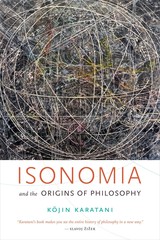
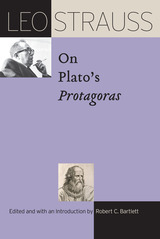
This book offers a transcript of Strauss’s seminar on Plato’s Protagoras taught at the University of Chicago in the spring quarter of 1965, edited and introduced by renowned scholar Robert C. Bartlett. These lectures have several important features. Unlike his published writings, they are less dense and more conversational. Additionally, while Strauss regarded himself as a Platonist and published some work on Plato, he published little on individual dialogues. In these lectures Strauss treats many of the great Platonic and Straussian themes: the difference between the Socratic political science or art and the Sophistic political science or art of Protagoras; the character and teachability of virtue, its relation to knowledge, and the relations among the virtues, courage, justice, moderation, and wisdom; the good and the pleasant; frankness and concealment; the role of myth; and the relation between freedom of thought and freedom of speech.
In these lectures, Strauss examines Protagoras and the sophists, providing a detailed discussion of Protagoras as it relates to Plato’s other dialogues and the work of modern thinkers. This book should be of special interest to students both of Plato and of Strauss.
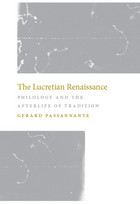

Platonic forms of love.
Plato of Athens, who laid the foundations of the Western philosophical tradition and in range and depth ranks among its greatest practitioners, was born to a prosperous and politically active family circa 427 BC. In early life an admirer of Socrates, Plato later founded the first institution of higher learning in the West, the Academy, among whose many notable alumni was Aristotle. Traditionally ascribed to Plato are thirty-five dialogues developing Socrates’ dialectic method and composed with great stylistic virtuosity, together with the Apology and thirteen letters.
The three works in this volume, though written at different stages of Plato’s career, are set toward the end of Socrates’ life (from 416) and explore the relationship between two people known as love (erōs) or friendship (philia). In Lysis, Socrates meets two young men exercising in a wrestling school during a religious festival. In Symposium, Socrates attends a drinking party along with several accomplished friends to celebrate the young tragedian Agathon’s victory in the Lenaia festival of 416: the topic of conversation is love. And in Phaedrus, Socrates and his eponymous interlocutor escape the midsummer heat of the city to the banks of the river Ilissus, where speeches by both on the subject of love lead to a critical discussion of the current state of the theory and practice of rhetoric.
This edition, which replaces the original Loeb editions by Sir Walter R. M. Lamb and by Harold North Fowler, offers text, translation, and annotation that are fully current with modern scholarship.

Socrates without Plato.
Xenophon (ca. 430 to ca. 354 BC), a member of a wealthy but politically quietist Athenian family and an admirer of Socrates, left Athens in 401 BC to serve as a mercenary commander for Cyrus the Younger of Persia, then joined the staff of King Agesilaus II of Sparta before settling in Elis and, in the aftermath of the battle of Leuctra in 371 BC, retiring to Corinth. His historical and biographical works, Socratic dialogues and reminiscences, and short treatises on hunting, horsemanship, economics, and the Spartan constitution are richly informative about his own life and times.
This volume collects Xenophon’s portrayals of his associate, Socrates. In Memorabilia (or Memoirs of Socrates) and in Oeconomicus, a dialogue about household management, we see the philosopher through Xenophon’s eyes. Here, as in the accompanying Symposium, we also obtain insight on life in Athens. The volume concludes with Xenophon’s Apology, an interesting complement to Plato’s account of Socrates’ defense at his trial.
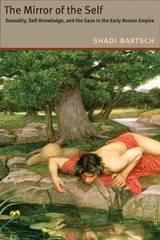
Weaving together literary theory, philosophy, and social history, Bartsch traces this complex notion of self from Plato’s Greece to Seneca’s Rome. She starts by showing how ancient authors envisioned the mirror as both a tool for ethical self-improvement and, paradoxically, a sign of erotic self-indulgence. Her reading of the Phaedrus, for example, demonstrates that the mirroring gaze in Plato, because of its sexual possibilities, could not be adopted by Roman philosophers and their students. Bartsch goes on to examine the Roman treatment of the ethical and sexual gaze, and she traces how self-knowledge, the philosopher’s body, and the performance of virtue all played a role in shaping the Roman understanding of the nature of selfhood. Culminating in a profoundly original reading of Medea, The Mirror of the Self illustrates how Seneca, in his Stoic quest for self-knowledge, embodies the Roman view, marking a new point in human thought about self-perception.
Bartsch leads readers on a journey that unveils divided selves, moral hypocrisy, and lustful Stoics—and offers fresh insights about seminal works. At once sexy and philosophical, The Mirror of the Self will be required reading for classicists, philosophers, and anthropologists alike.
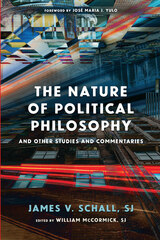
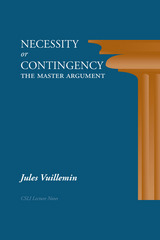
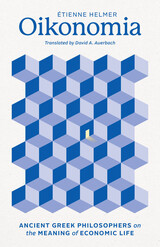
In this book, Étienne Helmer offers a comprehensive analysis of oikonomia in ancient Greek philosophy. Despite its similarity to the word “economy,” for the ancients, oikonomia named a branch of knowledge—the science of management—that was aimed at studying the practices we engage in to satisfy our needs. This began with the domestic sphere, but it radiated outward from the oikos (house) to encompass broader issues in the polis (city) as well. Helmer explores topics such as gender roles and marriage, property and the household, the acquisition and preservation of material goods, and how Greek philosophers addressed the issue of slavery in the ancient world. Even if we are not likely to share many of ancient thinkers’ beliefs today, Helmer shows that there was once a way of thinking of “economic life” that went beyond the mere accumulation of wealth, representing a key point of departure for understanding how to inhabit the world with others.

Atomic atheism in verse.
Lucretius (Titus Lucretius Carus) lived ca. 99–ca. 55 BC, but the details of his career are unknown. He is the author of the great didactic poem in hexameters, De Rerum Natura (On the Nature of Things). In six books compounded of solid reasoning, brilliant imagination, and noble poetry, he expounds the scientific theories of the Greek philosopher Epicurus, with the aim of dispelling fear of the gods and fear of death and so enabling man to attain peace of mind and happiness.
In Book 1 he establishes the general principles of the atomic system, refutes the views of rival physicists, and proves the infinity of the universe and of its two ultimate constituents, matter and void. In Book 2 he explains atomic movement, the variety of atomic shapes, and argues that the atoms lack color, sensation, and other secondary qualities. In Book 3 he expounds the nature and composition of mind and spirit, proves their mortality, and argues that there is nothing to fear in death. Book 4 explains the nature of sensation and thought, and ends with an impressive account of sexual love. Book 5 describes the nature and formation of our world, astronomical phenomena, the beginnings of life on earth, and the development of civilization. In Book 6 the poet explains various atmospheric and terrestrial phenomena, including thunder, lightning, earthquakes, volcanoes, the magnet, and plagues.
The work is distinguished by the fervor and poetry of the author.
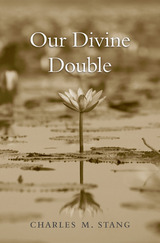
What if you were to discover that you were not entirely you, but rather one half of a whole, that you had, in other words, a divine double? In the second and third centuries CE, this idea gripped the religious imagination of the Eastern Mediterranean, providing a distinctive understanding of the self that has survived in various forms throughout the centuries, down to the present. Our Divine Double traces the rise of this ancient idea that each person has a divine counterpart, twin, or alter-ego, and the eventual eclipse of this idea with the rise of Christian conciliar orthodoxy.
Charles Stang marshals an array of ancient sources: from early Christianity, especially texts associated with the apostle Thomas “the twin”; from Manichaeism, a missionary religion based on the teachings of the “apostle of light” that had spread from Mesopotamia to the Mediterranean; and from Neoplatonism, a name given to the renaissance of Platonism associated with the third-century philosopher Plotinus. Each of these traditions offers an understanding of the self as an irreducible unity-in-duality. To encounter one’s divine double is to embark on a path of deification that closes the gap between image and archetype, human and divine.
While the figure of the divine double receded from the history of Christianity with the rise of conciliar orthodoxy, it survives in two important discourses from late antiquity: theodicy, or the problem of evil; and Christology, the exploration of how the Incarnate Christ is both human and divine.
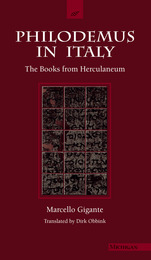
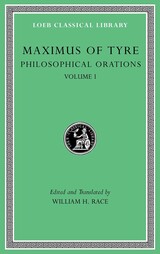
A Platonic evangelist’s lectures on the good life.
Maximus of Tyre, active probably in the latter half of the second century AD, was a devoted Platonist whose only surviving work consists of forty-one brief addresses on various topics of ethical, philosophical, and theological import including the nature of divinity, the immortality of the soul, the sources of good and evil, the injustice of vengeance, the tyranny of pleasures and desires, the contribution of the liberal arts, and the pursuit of happiness, among many others. These addresses are conveniently labeled orations, but their fluid and hybrid style resists precise generic categorization, so that they could also be called discourses, speeches, lectures, talks, inquiries, essays, or even sermons.
In his orations Maximus strove to elucidate the philosophical life of virtue, especially as exemplified in the career of Socrates and in the writings of Plato, inviting his audience, sometimes addressed as young men, to share in his knowledge, to appreciate his fresh presentation of philosophical topics, and perhaps even to join him in pursuing philosophy. Drawing on the Hellenic cultural tradition from Homer to the death of Alexander the Great, Maximus offers a rich collection of the famous philosophical, literary, and historical figures, events, ideas, successes, and failures that constituted Greek paideia in the so-called Second Sophistic era.
This edition of Maximus’ Philosophical Orations offers a fresh translation, ample annotation, and a text fully informed by current scholarship.
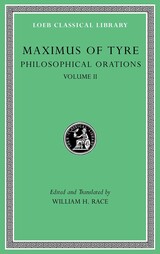
A Platonic evangelist’s lectures on the good life.
Maximus of Tyre, active probably in the latter half of the second century AD, was a devoted Platonist whose only surviving work consists of forty-one brief addresses on various topics of ethical, philosophical, and theological import including the nature of divinity, the immortality of the soul, the sources of good and evil, the injustice of vengeance, the tyranny of pleasures and desires, the contribution of the liberal arts, and the pursuit of happiness, among many others. These addresses are conveniently labeled orations, but their fluid and hybrid style resists precise generic categorization, so that they could also be called discourses, speeches, lectures, talks, inquiries, essays, or even sermons.
In his orations Maximus strove to elucidate the philosophical life of virtue, especially as exemplified in the career of Socrates and in the writings of Plato, inviting his audience, sometimes addressed as young men, to share in his knowledge, to appreciate his fresh presentation of philosophical topics, and perhaps even to join him in pursuing philosophy. Drawing on the Hellenic cultural tradition from Homer to the death of Alexander the Great, Maximus offers a rich collection of the famous philosophical, literary, and historical figures, events, ideas, successes, and failures that constituted Greek paideia in the so-called Second Sophistic era.
This edition of Maximus’ Philosophical Orations offers a fresh translation, ample annotation, and a text fully informed by current scholarship.
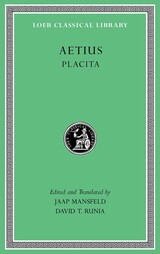
An ancient compendium of ancient philosophy.
Placita (Tenets), generally attributed to an author named Aëtius and dating from the late first or early second century AD, was a compendium setting out in summary fashion the principal doctrines and opinions of philosophers and philosophical schools in response to questions and topics in the domain of natural philosophy. Now lost, Placita can be largely reconstructed from the work of three authors working in the period from the second to the fifth century (Pseudo-Plutarch, Stobaeus, and Theodoret) who quote from it extensively.
Placita is organized into five books: First Principles; Cosmology; Meteorology and the Earth; Psychology; and Physiology. Each chapter contains a list of short opinions or tenets, which are ascribed to an individual philosopher and/or school and usually arranged in sections that stress the variety and contrast of the teachings concerned.
Designed as a multi-purpose resource, Placita long served as a manual of neatly packaged doxographic material on a wide variety of topics, to be used for study, as an aide-mémoire, for displays of erudition, for persuasion in rhetorical or apologetic contexts, and for personal enlightenment, and it remains a valuable source for our knowledge of Presocratic and Hellenistic philosophy.
This edition of Aëtius’ Placita offers a fresh translation, ample annotation, and a text fully informed by the latest scholarship.

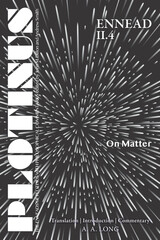
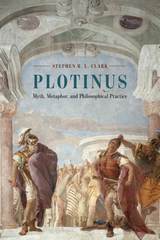
Clark examines a variety of Plotinus’s myths and metaphors within the cultural and philosophical context of his time, asking probing questions about their contemplative effects. What is it, for example, to “think away the spatiality” of material things? What state of mind is Plotinus recommending when he speaks of love, or drunkenness, or nakedness? What star-like consciousness is intended when he declares that we were once stars or are stars eternally? What does it mean to say that the soul goes around God? And how are we supposed to “bring the god in us back to the god in all”? Through these rich images and structures, Clark casts Plotinus as a philosopher deeply concerned with philosophy as a way of life.
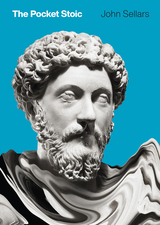
As John Sellars shows in The Pocket Stoic, the popular image of the isolated and unfeeling Stoic hardly does justice to the rich vein of thought that we find in the work of Seneca, Epictetus, and Marcus Aurelius, the three great Roman Stoics. Their works are recognized classics, and for good reason—they speak to some of the perennial issues that face anyone trying to navigate their way through life. These writings, fundamentally, are about how to live—how to understand your place in the world, how to cope when things don’t go well, how to manage your emotions, how to behave toward others, and finally, how to live a good life. To be a Stoic is to recognize that much of the suffering in your life is due to the way you think about things, and that you have the ability to train your mind to look at the world in a new way—to recognize what you can and cannot control and to turn adversity into opportunity.
Concise and accessible, The Pocket Stoic provides a welcome introduction to the lives and thought of the key Stoics. It is also a perfect guide to help you start incorporating the practice of Stoicism into your everyday approach to life.

With Poetic Justice, Jill Frank overturns the conventional view that the Republic endorses a hierarchical ascent to knowledge and the authoritarian politics associated with that philosophy. When learning to read is understood as the passive absorption of a teacher’s beliefs, this reflects the account of Platonic philosophy as authoritative knowledge wielded by philosopher kings who ruled the ideal city. When we learn to read by way of the method Socrates introduces in the Republic, Frank argues, we are offered an education in ethical and political self-governance, one that prompts citizens to challenge all claims to authority, including those of philosophy.

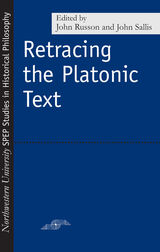

Yet when you look at ancient and early modern treatises on rhetoric, what you find is surprising: they’re crawling with animals. With Rhetoric in Tooth and Claw, Debra Hawhee explores this unexpected aspect of early thinking about rhetoric, going on from there to examine the enduring presence of nonhuman animals in rhetorical theory and education. In doing so, she not only offers a counter-history of rhetoric but also brings rhetorical studies into dialogue with animal studies, one of the most vibrant areas of interest in humanities today. By removing humanity and human reason from the center of our study of argument, Hawhee frees up space to study and emphasize other crucial components of communication, like energy, bodies, and sensation.
Drawing on thinkers from Aristotle to Erasmus, Rhetoric in Tooth and Claw tells a new story of the discipline’s history and development, one animated by the energy, force, liveliness, and diversity of our relationships with our “partners in feeling,” other animals.
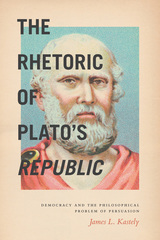
As Kastely shows, the Republic begins with two interrelated crises: one rhetorical, one philosophical. In the first, democracy is defended by a discourse of justice, but no one can take this discourse seriously because no one can see—in a world where the powerful dominate the weak—how justice is a value in itself. That value must be found philosophically, but philosophy, as Plato and Socrates understand it, can reach only the very few. In order to reach its larger political audience, it must become rhetoric; it must become a persuasive part of the larger culture—which, at that time, meant epic poetry. Tracing how Plato and Socrates formulate this transformation in the Republic, Kastely isolates a crucial theory of persuasion that is central to how we talk together about justice and organize ourselves according to democratic principles.
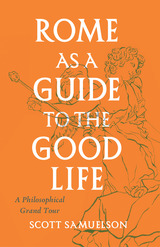
This is a guidebook to Rome for those interested in both la dolce vita and what the ancient Romans called the vita beata—the good life. Philosopher Scott Samuelson offers a thinker’s tour of the Eternal City, rooting ideas from this philosophical tradition within the geography of the city itself. As he introduces the city’s great works of art and its most famous sites—the Colosseum, the Forum, the Campo de’ Fiori—Samuelson also gets to the heart of the knotty ethical and emotional questions they pose. Practicing philosophy in place, Rome as a Guide to the Good Life tackles the profound questions that most tours of Rome only bracket. What does all this history tell us about who we are?
In addition to being a thoughtful philosophical companion, Samuelson is also a memorable tour guide, taking us on plenty of detours and pausing to linger over an afternoon Negroni, sample four classic Roman pastas, or explore the city’s best hidden gems. With Samuelson’s help, we understand why Rome has inspired philosophers such as Lucretius and Seneca, poets and artists such as Horace and Caravaggio, filmmakers like Fellini, and adventurers like Rosa Bathurst. This eclectic guidebook to Roman philosophy is for intrepid wanderers and armchair travelers alike—anyone who wants not just a change of scenery, but a change of soul.
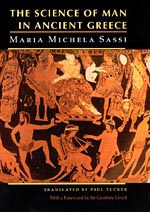
Maria Michela Sassi reconstructs Greek attempts to answer such questions from Homer's day to late antiquity, ranging across physiognomy, ethnography, geography, medicine, and astrology. Sassi demonstrates that in the Greek science of man, empirical observations were inextricably bound up with a prejudiced view of the free Greek male as superior to all others. Thus, because women were assumed to have pale skin from staying indoors too much, Greek biology and medicine sought to explain this feature as an indication of the "cold" nature of women, as opposed to the "hot" constitution of men.
For this English translation, Sassi has rewritten the introduction and updated the text and references throughout, and Sir Geoffrey Lloyd has provided a new foreword.
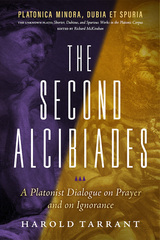

Robin Reames’s Seeming & Being in Plato’s Rhetorical Theory marks a shift in Plato scholarship. Reames argues that an appropriate understanding of rhetorical theory in Plato’s dialogues illuminates how he developed the technical vocabulary needed to construct the very distinctions between seeming and being that separate true from false speech. By engaging with three key movements of twentieth- and twenty-first-century Plato scholarship—the rise and subsequent marginalization of “orality and literacy theory,” Heidegger’s controversial critique of Platonist metaphysics, and the influence of literary or dramatic readings of the dialogues—Reames demonstrates how the development of Plato’s rhetorical theory across several of his dialogues (Gorgias, Phaedrus, Protagoras, Theaetetus, Cratylus, Republic, and Sophist) has been both neglected and misunderstood.
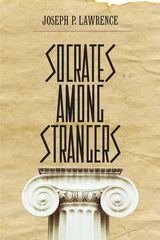
In Socrates among Strangers, Joseph P. Lawrence reclaims the enigmatic sage from those who have seen him either as a prophet of science, seeking the security of knowledge, or as a wily actor who shed light on the dangerous world of politics while maintaining a prudent distance from it. The Socrates Lawrence seeks is the imprudent one, the man who knew how to die.
The institutionalization of philosophy in the modern world has come at the cost of its most vital concern: the achievement of life wisdom. Those who have ceased to grow (those who think they know) close their ears to the wisdom of strangers—and Socrates, who stood face to face with death, is the archetypal stranger. His avowal of ignorance, Lawrence suggests, is more needed than ever in an age defined by technical mastery and expert knowledge.
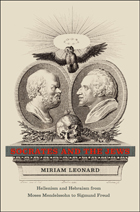
"What has Athens to do with Jerusalem?” Asked by the early Christian Tertullian, the question was vigorously debated in the nineteenth century. While classics dominated the intellectual life of Europe, Christianity still prevailed and conflicts raged between the religious and the secular. Taking on the question of how the glories of the classical world could be reconciled with the Bible, Socrates and the Jews explains how Judaism played a vital role in defining modern philhellenism.
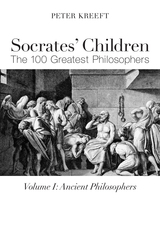
This is the first of a four-volume history of philosophy . . . on ancient, medieval, modern, and contemporary philosophy. After the fourth volume is produced in paper, a one-volume clothbound edition, containing all four paperbound editions, will be published.
Kreeft focuses on the “big ideas” that have influenced present people and present times, and includes relevant biographical data, proportionate to its importance for each thinker. Moreover, the aim of the work is to stimulate philosophizing, controversy, and argument. It uses ordinary language and logic, not jargon and symbolic logic, and it is commonsensical (like Aristotle) and existential in the sense that it sees philosophy as something to be lived and experienced in life. Philosophy, after all, is not about philosophy but reality . . . about wisdom, life and death, good and evil, and God.
Kreeft seeks to be simple and direct and clear. But it is not dumbed down and patronizing. It will stretch the reader, but it is meant for beginners, not just scholars. It can be used for college classes or do-it-yourselfers. It emphasizes surprises; remember, “philosophy begins in wonder.” And it includes visual aids: charts, cartoons, line drawings, and drawings of each philosopher.
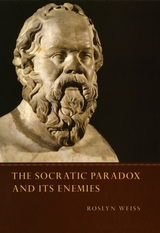
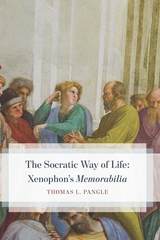
In the first part of the book, Pangle analyzes Xenophon’s defense of Socrates against the two charges of injustice upon which he was convicted by democratic Athens: impiety and corruption of the youth. In the second part, Pangle analyzes Xenophon’s account of how Socrates’s life as a whole was just, in the sense of helping through his teaching a wide range of people. Socrates taught by never ceasing to raise, and to progress in answering, the fundamental and enduring civic questions: what is pious and impious, noble and ignoble, just and unjust, genuine statesmanship and genuine citizenship. Inspired by Hegel’s and Nietzsche’s assessments of Xenophon as the true voice of Socrates, The Socratic Way of Life establishes the Memorabilia as the groundwork of all subsequent political philosophy.
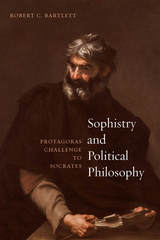
With Sophistry and Political Philosophy, Robert C. Bartlett provides the first close reading of Plato’s two-part presentation of Protagoras. In the “Protagoras,” Plato sets out the sophist’s moral and political teachings, while the “Theaetetus,” offers a distillation of his theoretical and epistemological arguments. Taken together, the two dialogues demonstrate that Protagoras is attracted to one aspect of conventional morality—the nobility of courage, which in turn is connected to piety. This insight leads Bartlett to a consideration of the similarities and differences in the relationship of political philosophy and sophistry to pious faith. Bartlett’s superb exegesis offers a significant tool for understanding the history of philosophy, but, in tracing Socrates’s response to Protagoras’ teachings, Bartlett also builds toward a richer understanding of both ancient sophistry and what Socrates meant by “political philosophy.”
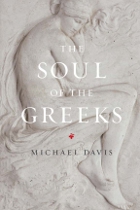
The understanding of the soul in the West has been profoundly shaped by Christianity, and its influence can be seen in certain assumptions often made about the soul: that, for example, if it does exist, it is separable from the body, free, immortal, and potentially pure. The ancient Greeks, however, conceived of the soul quite differently. In this ambitious new work, Michael Davis analyzes works by Homer, Herodotus, Euripides, Plato, and Aristotle to reveal how the ancient Greeks portrayed and understood what he calls “the fully human soul.”
Beginning with Homer’s Iliad, Davis lays out the tension within the soul of Achilles between immortality and life. He then turns to Aristotle’s De Anima and Nicomachean Ethics to explore the consequences of the problem of Achilles across the whole range of the soul’s activity. Moving to Herodotus and Euripides, Davis considers the former’s portrayal of the two extremes of culture—one rooted in stability and tradition, the other in freedom and motion—and explores how they mark the limits of character. Davis then shows how Helen and Iphigeneia among the Taurians serve to provide dramatic examples of Herodotus’s extreme cultures and their consequences for the soul. The book returns to philosophy in the final part, plumbing several Platonic dialogues—the Republic, Cleitophon, Hipparchus, Phaedrus, Euthyphro, and Symposium—to understand the soul’s imperfection in relation to law, justice, tyranny, eros, the gods, and philosophy itself. Davis concludes with Plato’s presentation of the soul of Socrates as self-aware and nontragic, even if it is necessarily alienated and divided against itself.
The Soul of the Greeks thus begins with the imperfect soul as it is manifested in Achilles’ heroic, but tragic, longing and concludes with its nontragic and fuller philosophic expression in the soul of Socrates. But, far from being a historical survey, it is instead a brilliant meditation on what lies at the heart of being human.


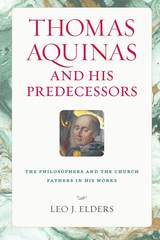
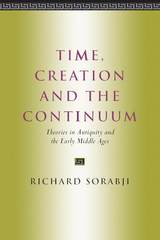
“Splendid. . . . The canvas is vast, the picture animated, the painter nonpareil. . . . Sorabji’s work will encourage more adventurers to follow him to this fascinating new-found land.”—Jonathan Barnes, Times Literary Supplement
“One of the most important works in the history of metaphysics to appear in English for a considerable time. No one concerned with the problems with which it deals either as a historian of ideas or as a philosopher can afford to neglect it.”—Donald MacKinnon, Scottish Journal of Theology
“Unusually readable for such scholarly content, the book provides in rich and cogent terms a lively and well-balanced discussion of matters of concern to a wide academic audience.”—Choice
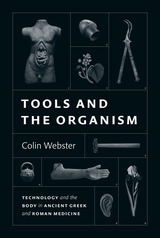
Medicine is itself a type of technology, involving therapeutic tools and substances, and so one can write the history of medicine as the application of different technologies to the human body. In Tools and the Organism, Colin Webster argues that, throughout antiquity, these tools were crucial to broader theoretical shifts. Notions changed about what type of object a body is, what substances constitute its essential nature, and how its parts interact. By following these changes and taking the question of technology into the heart of Greek and Roman medicine, Webster reveals how the body was first conceptualized as an “organism”—a functional object whose inner parts were tools, or organa, that each completed certain vital tasks. He also shows how different medical tools created different bodies.
Webster’s approach provides both an overarching survey of the ways that technologies impacted notions of corporeality and corporeal behaviors and, at the same time, stays attentive to the specific material details of ancient tools and how they informed assumptions about somatic structures, substances, and inner processes. For example, by turning to developments in water-delivery technologies and pneumatic tools, we see how these changing material realities altered theories of the vascular system and respiration across Classical antiquity. Tools and the Organism makes the compelling case for why telling the history of ancient Greco-Roman medical theories, from the Hippocratics to Galen, should pay close attention to the question of technology.
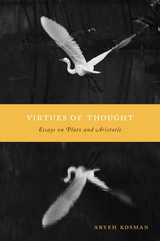
Virtues of Thought is an excursion through interconnecting philosophical topics in Plato and Aristotle, under the expert guidance of Aryeh Kosman. Exploring what these two foundational figures have to say about the nature of human awareness and understanding, Kosman concludes that ultimately the virtues of thought are to be found in the joys and satisfactions that come from thinking philosophically, whether we engage in it ourselves or witness others’ participation.
Kosman examines Aristotle’s complex understanding of the role that reason plays in practical choice and moral deliberation, and the specific forms of thinking that are involved in explaining the world and making it intelligible to ourselves and others. Critical issues of consciousness and the connection between thinking and acting in Aristotle’s philosophical psychology lead to a discussion of the importance of emotion in his theory of virtue. Theories of perception and cognition are highlighted in works such as Aristotle’s Posterior Analytics. When his focus turns to Plato, Kosman gives original accounts of several dialogues concerning Plato’s treatment of love, self-knowledge, justice, and the complex virtue known as sophrosyne in such texts as Charmides and the Republic.
Bringing together in a single volume previously unpublished essays along with classics in the field, Virtues of Thought makes a significant contribution to our study of ancient Greek philosophy.
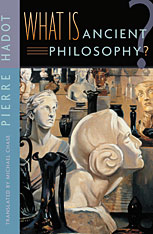
A magisterial mappa mundi of the terrain that Pierre Hadot has so productively worked for decades, this ambitious work revises our view of ancient philosophy—and in doing so, proposes that we change the way we see philosophy itself. Hadot takes ancient philosophy out of its customary realm of names, dates, and arid abstractions and plants it squarely in the thick of life. Through a meticulous historical reading, he shows how the various schools, trends, and ideas of ancient Greek and Roman philosophy all tended toward one goal: to provide a means for achieving happiness in this life, by transforming the individual’s mode of perceiving and being in the world.
Most pressing for Hadot is the question of how the ancients conceived of philosophy. He argues in great detail, systematically covering the ideas of the earliest Greek thinkers, Hellenistic philosophy, and late antiquity, that ancient philosophers were concerned not just to develop philosophical theories, but to practice philosophy as a way of life—a way of life to be suggested, illuminated, and justified by their philosophical “discourse.” For the ancients, philosophical theory and the philosophical way of life were inseparably linked.
What Is Ancient Philosophy? also explains why this connection broke down, most conspicuously in the case of academic, professional philosophers, especially under the influence of Christianity. Finally, Hadot turns to the question of whether and how this connection might be reestablished. Even as it brings ancient thoughts and thinkers to life, this invigorating work provides direction for those who wish to improve their lives by means of genuine philosophical thought.
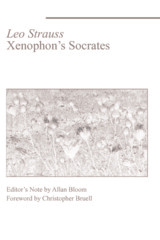
READERS
Browse our collection.
PUBLISHERS
See BiblioVault's publisher services.
STUDENT SERVICES
Files for college accessibility offices.
UChicago Accessibility Resources
home | accessibility | search | about | contact us
BiblioVault ® 2001 - 2024
The University of Chicago Press









